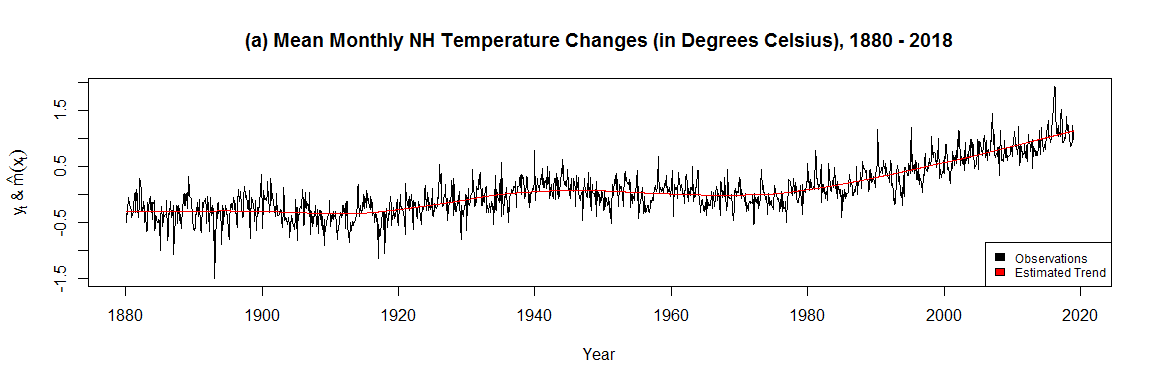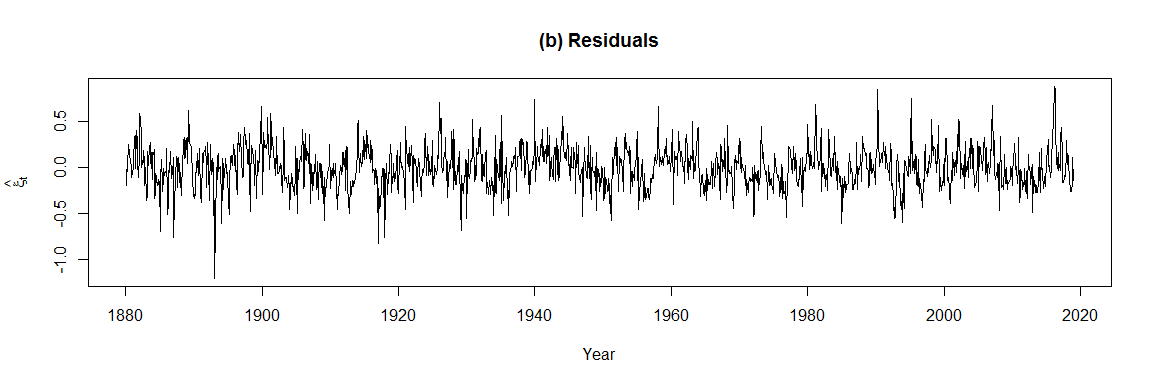

The goal of smoots is to provide an easy way to estimate the nonparametric trend and its derivatives in equidistant time series with short-memory stationary errors. The main functions allow for data-driven estimates via local polynomial regression with an automatically selected optimal bandwidth.
You can install the released version of smoots from CRAN with:
This is a basic example which shows you how to solve a common problem. The data tempNH in the package includes the mean monthly temperature changes in degrees Celsius of the Northern Hemisphere (NH) from 1880 to 2018. The data was obtained from the Goddard Institute for Space Studies of the National Aeronautics and Space Administration (NASA). Let (n) be the number of observations. The data is assumed to follow an additive model
[y_{t} = m(x_{t}) + _{t},]
where (t=1, , n), (y_{t}) are the observed values, (x_{t} = t/n) are the rescaled observation time points on the closed interval between (0) and (1), (m(x_{t})) is a smooth trend function and ({t}) is a zero-mean stationary error term. The user-friendly and simply applicable function msmooth() for the estimation of (m(x{t})) in the additive model will be used.
data <- tempNH # Call the 'tempNH' data frame
Yt <- data$Change # Store the actual values as a vector
# Estimate the trend function via the 'smoots' package
results <- msmooth(Yt, p = 1, mu = 1, bStart = 0.15, alg = "A")
# Easily access the main estimation results
b.opt <- results$b0 # The optimal bandwidth
trend <- results$ye # The trend estimates
resid <- results$res # The residuals
b.opt
#> [1] 0.101089

An optimal bandwidth of (0.1009) was selected by the iterative plug-in algorithm (IPI) within msmooth(). Moreover, the estimated trend fits the data suitably and the residuals seem to be stationary. Since the trend was obtained without any parametric assumpions with respect to (_{t}), the residuals could now be further analyzed by means of any suitable parametric approach, e.g. autoregressive-moving-average (ARMA) models.
The functions can also be used for the implementation of semiparametric generalized autoregressive conditional heteroskedasticity (Semi-GARCH) models and its various variants in Financial Econometrics (see also the examples in the documentation of msmooth() and tsmooth()).
In smoots five functions are available.
dsmooth: Data-driven Local Polynomial for the Trend’s Derivatives in Equidistant Time Seriesgsmooth: Estimation of Trends and their Derivatives via Local Polynomial Regressionknsmooth: Estimation of Nonparametric Trend Functions via Kernel Regressionmsmooth: Data-driven Nonparametric Regression for the Trend in Equidistant Time Seriestsmooth: Advanced Data-driven Nonparametric Regression for the Trend in Equidistant Time SeriesFor further information on each of the functions, we refer the user to the manual or the package documentation.